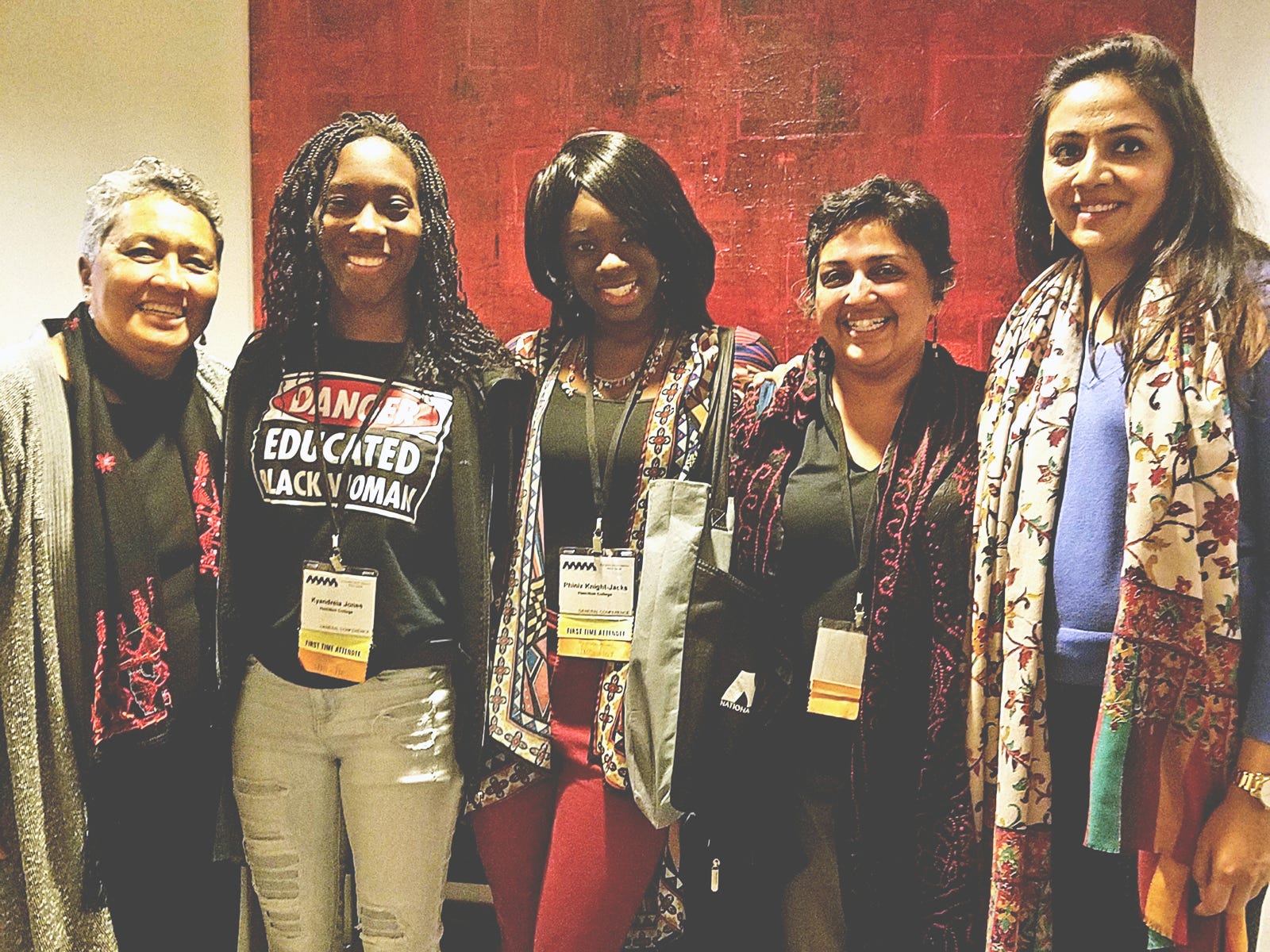
When Hamilton students Kyandreia Jones ’19 and Phinix Knight-Jacks ’19 enrolled in the course “Indians, Aliens, and Others” their sophomore year, they were unaware that the connection they would form with Assistant Professor of Literature Pavitra Sundar would lead her to invite them to participate in the prestigious National Women’s Studies Association conference in Atlanta (Nov. 8–11) nearly two years later.
The National Women’s Studies Association, established in 1977, seeks “to illuminate the ways in which women’s studies are vital to education,” with its main objectives being to promote and support the “production and dissemination of knowledge about women and gender through teaching, learning, research and service in academic and other settings,” according to the organization’s website. The theme of this year’s conference, titled “JUST IMAGINE. IMAGINING JUSTICE: Feminist visions of freedom, dream making and the radical politics of futures,” encouraged scholars in attendance to discuss significant works that called for the creation of “projects, paradigms and movements based on what we are for” rather than just building projects simply based on “what we are against.”
Jones and Knight-Jacks joined Sundar, Assistant Professor of Anthropology Mariam Durrani, and Lecturer for the Levitt Center Margo Okazawa-Rey on their panel titled “Undergraduate ‘Community Engagement’ Learning and Teaching: Transnational Feminist Methodologies,” in which they discussed the importance of experiential learning and found links between coursework and the broader world.
On the panel, Jones and Knight-Jacks shared the experience of conducting their “Hamilton Assignments,” the final project of Sundar’s curriculum in which each student chooses a structure or space on Hamilton’s campus which challenges the theories of the course.
For Jones’ “Hamilton Assignment,” she decided to focus on the sun porch of Commons Dining Hall, an area that she said has been jokingly referred to as “minority row” among some members of the College’s Posse Scholars Program. Jones, a Posse Scholar herself, explained that this term was coined because “so many people of color sit there because they don’t feel comfortable going into the main room [of Commons.]” She also observed that the College’s food service workers seem to generally sit in the sun porch area rather than dining inside the main room.
The members of the all-Hamilton panel at the conference expressed the ways that the “Indians, Aliens, and Others” course allowed them to talk about theory and also see it in practice, an aspect of her academic experience that Jones said she felt she lacked previously. She had always spoken about racism, classism, and sexism in theory within her classes, but never had a space to discuss occurrences on a face-to-face basis, such as an example she used of someone skipping her in the Commons bagel line.
Speaking on this experience, Jones said, “That’s a very small example, but it’s always interesting to me because I’m always in a position where I have to think about what everything means because if I don’t think about that, I’m the one who looks like they’re crazy or foolish or just invisible.”
The admiration Sundar has shown for Jones and Knight-Jacks is mutual. Jones spoke of her awe in being able to communicate with the professor as a peer without her grade for the course lingering in the back of her mind.
Additionally, Jones praised the impact of Sundar’s teaching methods and curriculum, saying, “I took that course my sophomore spring and people who took that course are currently mentioning the things we learned in her course for other courses.
“It is that relevant and that crucial that it’s influencing our thinking in other courses. It’s been happening to me for the past one and a half years and I get to see it from the front row seat in other people.”
Jones added that the in-class discussions forced her to confront her own privilege as someone who is able-bodied, and has led her to be more mindful of how she perceives the construction of Hamilton’s campus is indicative of many ways in which the school does not know how to accommodate marginalized identities.
Through this broadly applicable in-class learning as well as her work on the “Hamilton Assignments,” Jones gained both confidence and knowledge.
She said: “Not only do I feel validated in my experience as a black woman in the world and on campus, I felt informed and like I learned a lot about my own shortcomings and my own privileges that I didn’t think I had.”
After attending workshops, discussions, and panels led by educators from all over the country, Knight-Jacks and Jones spent their final night at the conference in a grand ballroom with all the members of the conference, where they waited to hear from the conference’s keynote speakers.
The lectures that night were delivered by Pulitzer Prize-winner Alice Walker — author of acclaimed novel
The Color Purple
— and educator Beverly Guy-Sheftall, a Black feminist scholar who is the founding director of the Women’s Research and Resource Center and the Anna Julia Cooper Professor of Women’s Studies at Spelman College. Guy-Sheftall also serves as the President of the National Women’s Studies Association.

















